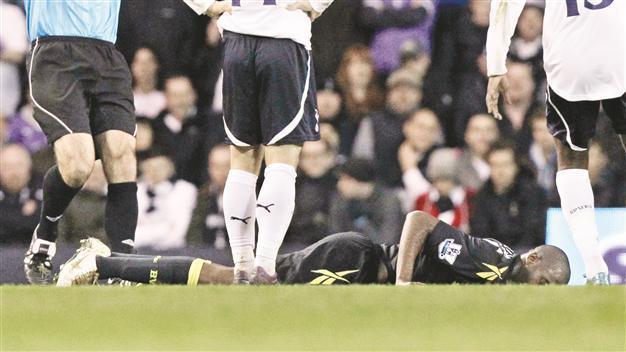FIFA to extend research into cardiac arrest cases
ZURICH - The Associated Press

FIFA decides to extend research into cardiac arrest cases in football in the wake of Bolton Wanderers player Fabrice Muamba’s collapsing during an FA Cup game. AP photo
FIFA is extending research into cardiac arrest cases involving footballers to learn about the condition which caused Bolton midfielder Fabrice Muamba to collapse during a match.FIFA’s chief medical officer, Jiri Dvorak, said yesterday that the project will be advanced at FIFA’s medical conference scheduled for May 23-24 in Budapest, Hungary.
“We have invited all national-team doctors to establish a worldwide database for cases of sudden cardiac arrest,” Dvorak said. “This will lead to analysis of the risk factors.”
Muamba’s condition is serious but stable in a London hospital, nine days after he collapsed during the first half of an FA Cup match at Tottenham’s White Hart Lane stadium.
New project
The 23-year-old Muamba’s recovery has been followed avidly across the world, but Dvorak hopes FIFA’s new project will provide medical researchers with important information about lower-profile cases.
“Sometimes we only get (details of) individual cases through the media. When we get the files we can analyze them,” he said.
The FIFA Medical Assessment and Research Center (F-MARC) also helped complete a recent study of electrocardiogram (ECG) testing in African players. Muamba was born in Zaire.
Dvorak said the study of 230 healthy players in Gabon was needed because most data from ECG testing, which looks for electric faults of the heart, is related to people of Caucasian ethnicity.
FIFA also contributed to a summit of cardiologists in Seattle last month.
The two-day session focused on how to better interpret readings of ECGs performed on athletes, Dvorak said.
Dvorak pointed to the 2003 death of Marc-Vivien Foe, who collapsed while playing for Cameroon against Colombia in a Confederations Cup match as a turning point in football’s awareness of heart problems.
“It was the imperative wake-up call that we have to deal with this situation and do everything to mitigate the risk factor,” he said.
FIFA began insisting on cardiovascular and cardiorespiratory tests for all World Cup players before the 2006 tournament in Germany.
















